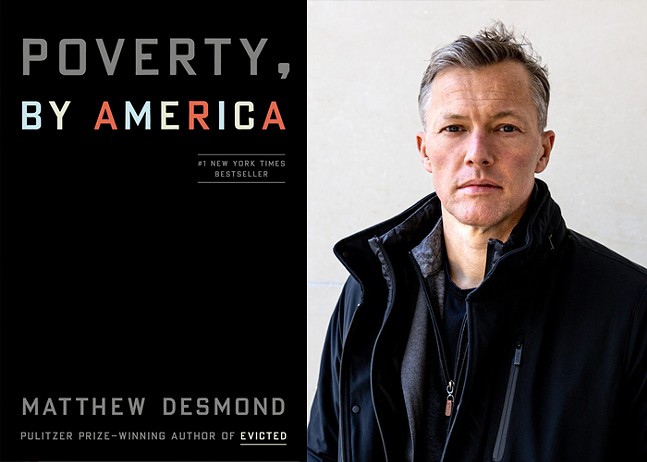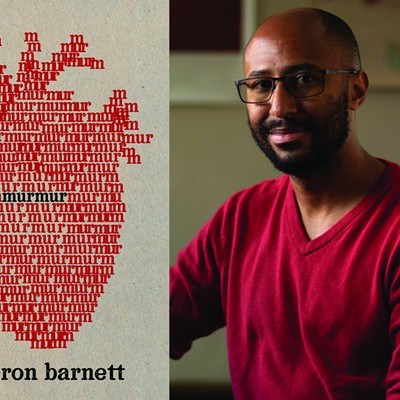But one thing he observed in Moscow shocked Tolstoy: rampant poverty. He sought reasons why everywhere he turned there were beggars, sex workers, and others who were struggling and destitute. Finally, after much contemplation, Tolstoy figured out why so many were poor: “I sit on a man’s back choking him and making him carry me, and yet assure myself and others that I am very sorry for him and wish to ease his lot by all means possible — except by getting off his back,” Tolstoy wrote in the essay "What Then Must We Do?"
In Matthew Desmond’s new bestselling book Poverty, By America (Penguin Random House), the Pulitzer Prize-winning author and sociologist includes this anecdote to illustrate how poverty has long been a global issue, despite a historic unwillingness to admit that poverty exists.
“I think there was a time in America where the financially privileged were pretty unaware of how much poverty was in the country and how deep and scarring it was,” says Desmond, who appears on Mon., Oct. 2 as a guest of Pittsburgh Arts & Lectures Ten Evenings series. “When Michael Harrington [author of The Other America: Poverty in the United States] started poking around at the poverty numbers [in the 1970s] and The New Yorker covered his work, I feel like that was when a lot of Americans turned to those pages and were shocked. I don’t think that’s the story anymore. It’s not only about the availability of information, but I also think it’s about the encroachment of poverty into affluence.”
The premise of Poverty, By America, is straightforward — those who are affluent both knowingly and unknowingly keep poor people poor.
Pittsburgh City Paper spoke with Desmond about how to address this issue at a time when economic disparity has become increasingly more glaring.
(This interview has been edited for length and clarity.)
There have been efforts to address poverty in the U.S., notably the New Deal in the 1930s promoted by President Franklin Delano Roosevelt, and the War on Poverty, championed by President Lyndon Baines Johnson in the 1960s. Have any other administrations tried to combat poverty?
Desmond: I think the Affordable Care Act [in the Obama administration] was an incredibly important piece of legislation. It affected millions and millions of folks that were previously uninsured. … But a lot of our leaders in Washington just don’t want to say that word, the `P’ word. They’d rather talk about the middle class or work or inequality. But when it comes to poverty, they’re all very quiet.The pandemic response was an incredible anti-poverty response. The American Rescue Plan reduced child poverty by 46% in six months. I think that can be realized as another major step in the right direction. What makes that story so sad, for me, was that it was temporary.
You point out that almost everyone in the U.S. receives social benefits, whether it’s through employee-sponsored healthcare, mortgage interest deductions, or 529 plans [tax-advantaged saving plans for future education costs]. Is it possible to reframe these benefits in a way that shows that allocating money for impoverished citizens is a similar type of assistance?
Desmond: It was shocking to me to learn that the average family at the bottom 20% gets about $26,000 a year from the government, but the average family in the top 20% gets about $35,000. That's a stunner. For me, the implication of that pattern is the recognition that this line you hear all the time from our elected officials that we can't afford to do more, it’s just a lie. We certainly can afford to do more to fight poverty if we devoted more resources to that instead of all the resources for the fortunate.One of your solutions for coming up with more funds to address poverty is to find a more equitable and efficient way of collecting taxes.
Desmond: I think that if we didn’t even touch the tax rates if we just left them where they were and committed more resources to making sure that people paid their taxes, that would do a lot. Studies show that if the top 1% of Americans just paid the taxes they owed, if they stopped evading or avoiding paying taxes … they could raise $125 billion a year, which is almost enough to lift everyone out of poverty, above the official poverty line. It’s all right there.There’s an ongoing debate about whether artificial intelligence will create or take away jobs in the U.S. But are there any AI applications that can be used to combat poverty?
Desmond: I think we can think of ways to harness that power, for example, to connect families to social services in a way that we do not have right now. Or to synthesize and streamline the administrative burden of applying for social aid from the government.On the job market, I think the way the debate is right now is how are you going to set it up. Will it be a job disruptor or a job creator? I wish that it would be set up in a different way, which would be about worker happiness. Given the giant loss of worker power over the last 50 years, even if artificial intelligence isn’t as disruptive as some believe it to be, the question should also be what is this going to mean to workers’ salaries, to workers’ power, to workers’ representation? Which is just another way of saying it doesn’t feel like we’re rolling this change out in a democratic way.
Pittsburgh Arts & Lectures presents Matthew Desmond. 7:30 p.m. Mon., Oct. 2. Carnegie Library Lecture Hall. 4400 Forbes Ave., Oakland. Online tickets $18. pittsburghlectures.org



















